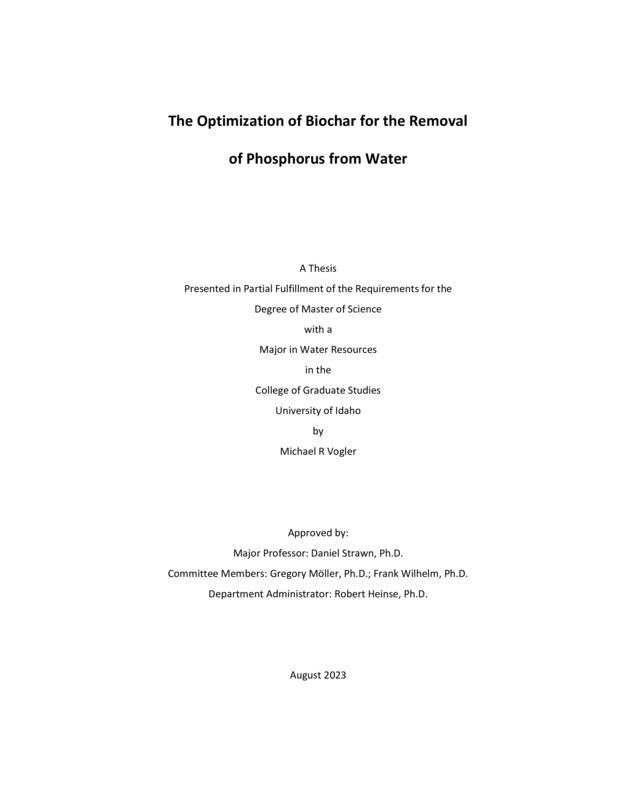The Optimization of Biochar for the Removal of Phosphorus from Water
Vogler, Michael R. (2023-08). The Optimization of Biochar for the Removal of Phosphorus from Water. Theses and Dissertations Collection, University of Idaho Library Digital Collections. https://www.lib.uidaho.edu/digital/etd/items/vogler_idaho_0089n_12671.html
- Title:
- The Optimization of Biochar for the Removal of Phosphorus from Water
- Author:
- Vogler, Michael R
- ORCID:
- 0009-0001-0675-7878
- Date:
- 2023-08
- Keywords:
- Biochar Chemical Modifications Iron-modified Biochar Phosphorus Water Treatment
- Program:
- Soil & Water Systems
- Subject Category:
- Water resources management; Environmental science; Soil sciences
- Abstract:
-
Phosphorous (P) pollution from anthropogenic activities is contributing to increases in eutrophication in freshwater systems. In addition, the demand for plant-available P sources continues to increase globally. Biochar, a substance created through biomass pyrolysis, has shown potential for removing P from wastewater. Numerous published studies indicate that chemically modified biochar is more effective at P removal than unmodified biochar. To identify the most suitable type of biochar for future modification for P removal and storage, several characterization experiments were conducted. After conducting the characterization experiments on fourteen biochar types, four were chosen for further experimentation. These biochars were then chemically altered to optimize P adsorption. The modification agents used were Ca, Mg, Fe cations, and cationic polymers. 4% Fe-modified biochar was determined to be the best and it was incorporated into a bench scale continuous flow reactor with dairy effluent wastewater to simulate real wastewater treatment applications. The biochar was then recovered from the reactor and experiments were done to determine the quantity of recoverable plant available P and total P. The Fe-modified biochar treatment had a significant increase in plant available P from 27 to 138 mg/kg. However, this was still lower than the initial value of unmodified biochar, which was 646 mg/kg and increased to 680 mg/kg after treatment. Total P was highest in the Fe-biochar post-treatment with the flow reactor at 1224 mg/kg, while the unmodified biochar had a total P of 993 mg/kg. Results from the research will enable P recycling using modified biochars that can be used as a soil amendment. To test biochar use for P recycling, a pilot study was conducted at Elk Mountain Farms, Idaho, to assess the effectiveness of Fe-modified biochar in removing P from groundwater impacted by agriculture. The University of Idaho Clean Water Machine, which uses reactive filtration technology, was utilized to remove and recover P from groundwater. The water samples showed that for 4% Fe-modified Pacific Biochar, total P in the water dropped from 0.166 mg/L to 0.019 mg/L between the influent and effluent samples, while ortho-phosphate decreased from 0.102 mg/L to 0.008 mg/L. Total P for the unmodified biochar dropped from 0.091 mg/L to 0.025 mg/L between the influent and effluent samples, and ortho-phosphate decreased from 0.049 mg/L to 0.003 mg/L. Both the unmodified biochar and the Fe-modified treatment showed an increase in total P after being used in the reactive filtration. The unused unmodified biochar had an initial P amount of 725 mg/kg, which increased to 1108 mg/kg after water treatment. Similarly, the Fe-modified treatment had an initial P amount of 614 mg/kg, which increased to 995 mg/kg after water treatment. These results indicate that biochar has the potential to be used to remove P from water, especially if the biochar is modified to do so.
- Description:
- masters, M.S., Soil & Water Systems -- University of Idaho - College of Graduate Studies, 2023-08
- Major Professor:
- Strawn, Daniel G
- Committee:
- Moller, Gregory; Wilhelm, Frank M; Heinse, Robert
- Defense Date:
- 2023-08
- Identifier:
- Vogler_idaho_0089N_12671
- Type:
- Text
- Format Original:
- Format:
- application/pdf
- Rights:
- In Copyright - Educational Use Permitted. For more information, please contact University of Idaho Library Special Collections and Archives Department at libspec@uidaho.edu.
- Standardized Rights:
- http://rightsstatements.org/vocab/InC-EDU/1.0/

